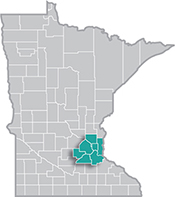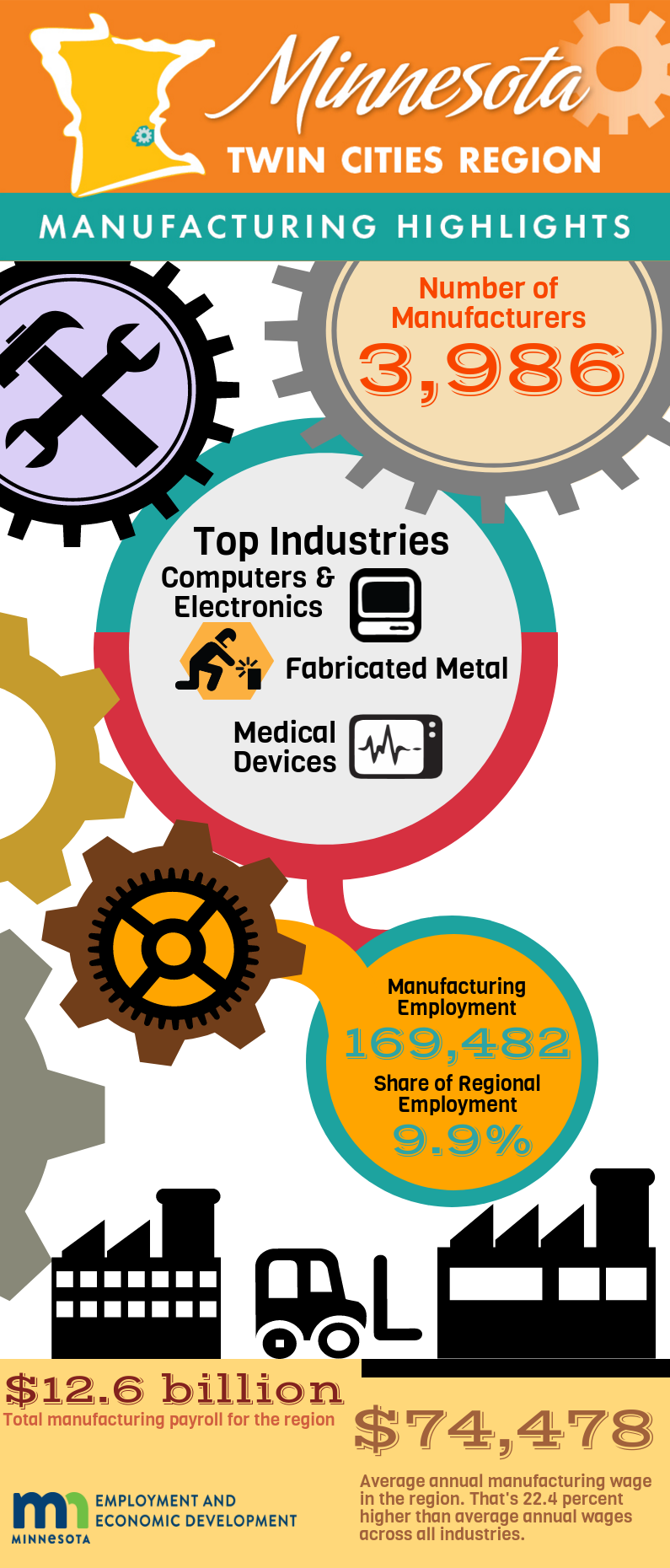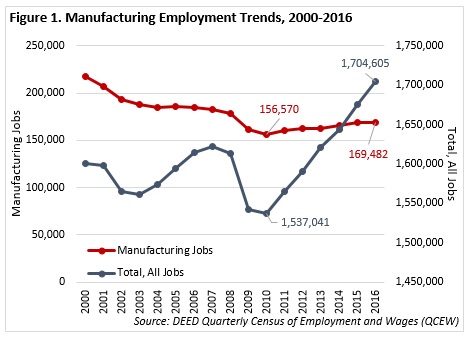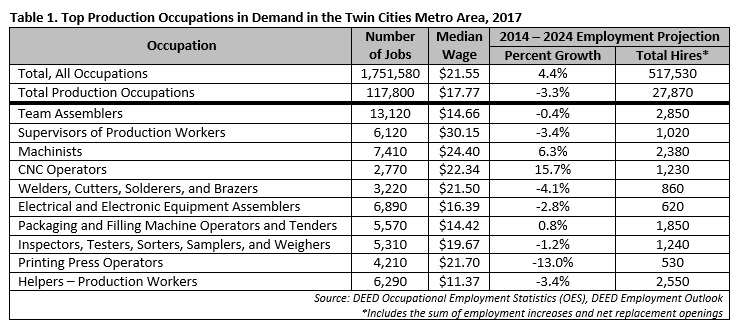 The Minneapolis-St. Paul metropolitan area is a national leader in finance, advanced manufacturing, agriculture and retailing.
The Minneapolis-St. Paul metropolitan area is a national leader in finance, advanced manufacturing, agriculture and retailing.
Medical devices, electronics and processed foods are strong suits recognized globally.
Want the freshest data delivered by email? Subscribe to our regional newsletters.
10/2/2017 10:09:32 AM
Tim O'Neill
 With 169,482 jobs at 3,986 establishments, manufacturing is the second largest employing industry in the seven-county Twin Cities metro area planning region, behind only health care and social assistance. Manufacturing accounts for 9.9 percent of total employment in the Twin Cities, about 1.5 percent less concentrated than in the state as a whole, where 11.3 percent of total jobs are in manufacturing.
With 169,482 jobs at 3,986 establishments, manufacturing is the second largest employing industry in the seven-county Twin Cities metro area planning region, behind only health care and social assistance. Manufacturing accounts for 9.9 percent of total employment in the Twin Cities, about 1.5 percent less concentrated than in the state as a whole, where 11.3 percent of total jobs are in manufacturing.
Manufacturing within the Twin Cities metro area has continued to grow since the end of the Great Recession in 2010. More specifically, between 2010 and 2016, manufacturing in the region grew by 8.2 percent, equivalent to nearly 13,000 new jobs. During the same period of time, the metro area's total economy grew by 10.9 percent, adding over 167,000 jobs. While manufacturing has grown at a slower clip than the total of all industries since 2010, it's important to remember that the industry sector was hemorrhaging an average of 6,000 jobs per year in the previous decade. Within the last year of available data, between 2015 and 2016, manufacturing added over 1,000 jobs, a much more welcome trend (see Figure 1 below).
Zooming in, the largest-employing manufacturing subsectors include computer and electronic product manufacturing (36,032 jobs), fabricated metal product manufacturing (24,434 jobs), miscellaneous manufacturing (which includes medical devices) (18,055 jobs), machinery manufacturing (17,139 jobs), and printing and related support activities (14,306 jobs). At $74,478 in 2016, the average annual wage for manufacturing was 22.4 percent higher than the average annual wage for the total of all industries.
One of the highest paying industries in the region, manufacturing payroll surpassed $12.6 billion in 2016, accounting for 12.2 percent of total payroll in the Twin Cities. Average annual wages in manufacturing were $74,478 in 2016, which was about $13,600 and 22.4 percent higher than average annual wages across the total of all industries. Starting much higher, manufacturing wages increased just 0.4 percent over the past year, compared to a 0.9 percent wage increase across all industries from 2015 to 2016.

Those cities in the metro area with the most manufacturing employment include Minneapolis (13,499 jobs), Plymouth (9,807 jobs), Fridley (8,585 jobs), Eden Prairie (8,127 jobs), Bloomington (7,526 jobs), St. Paul (7,506 jobs), Brooklyn Park (6,238 jobs), Maple Grove (5,554 jobs), Eagan (5,074 jobs), and Chaska (4,471 jobs). Altogether, these 10 cities account for 45 percent of the metro area's total manufacturing employment. In terms of growth, between 2010 and 2016, the cities taking the top spots include Brooklyn Park (+1,405 jobs), Lakeville (+1,259 jobs), Shakopee (+955 jobs), Eden Prairie (+861 jobs), and Burnsville (+838 jobs).
With manufacturing employment on the rise throughout the metro area, what occupations are in-demand? Updated in July of 2017, DEED's Occupations in Demand tool answers this question. Many of these occupations offer excellent wages, while at the same time not requiring extensive post-secondary education. For example, CNC operators (otherwise known as computer-controlled machine tool operators) earned a median hourly wage of $22.34, and were projected to have 1,230 total openings in the region through 2024. The typical education needed for this occupation is a high school diploma, although more advanced training can be found at career and technical colleges throughout the Twin Cities. Interested jobseekers can use DEED's new Career and Education Explorer tool to research any production occupation, and if interested, apply for jobs.

Contact Tim O'Neill at 651-259-7401.